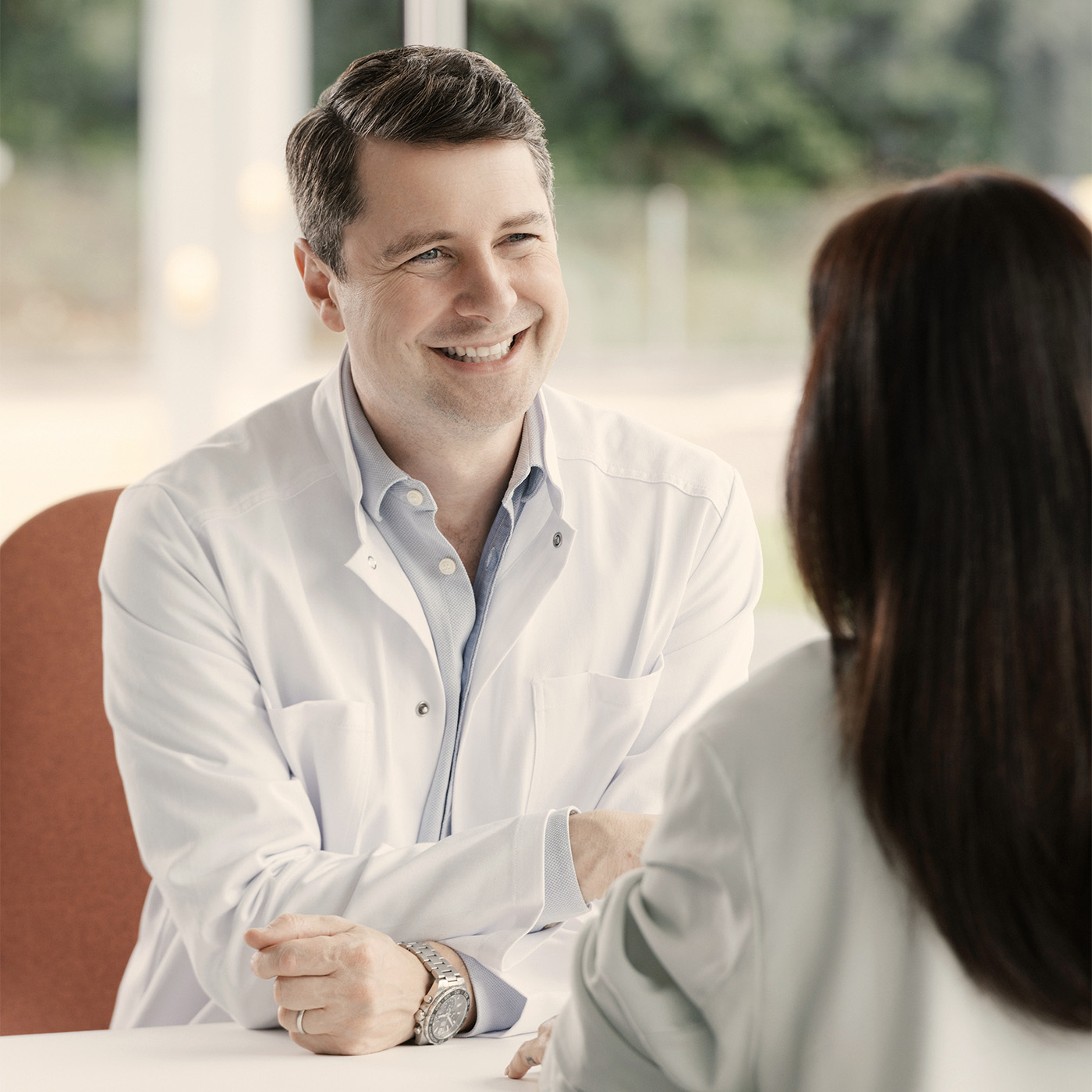Chlamydia
Identifying and treating chlamydia – discreet testing at Derma Medical Clinic in Zurich-Sihlcity
Chlamydia
Chronische Abszesse und schmerzhafte Knoten durch erfahrenen Hautarzt abklären und behandeln in der Derma Medical Clinic in Zürich - Sihlcity
Chlamydia is one of the most common sexually transmitted infections and often goes unnoticed for a long time. At Derma Medical Clinic, we check for infection using a simple urine test or a swab.
Tests
Urine sample or swab
Procedure
Swab and/or urine sample
Lab analysis
Duration
between 10 and 15 minutes
What is chlamydia?
Chlamydia is a type of bacteria that causes one of the most common sexually transmitted infections, often without causing symptoms.
It mainly affects the urethra, cervix and fallopian tubes. In men, it can also involve the epididymis and prostate.
Without treatment, it can lead to inflammation and – in women – can affect fertility over time.
Common symptoms in women:
- unusual discharge
- bleeding between periods
- burning sensation when urinating
- lower abdominal pain
Common symptoms in men:
- burning sensation when urinating
- cloudy discharge from the urethra
- occasional pain or swelling in the testicle area
Testing for chlamydia is recommended if you …
- notice a burning or unusual feeling when urinating that doesn’t match a typical bladder infection
- see changes in your discharge – in color, amount, or smell
- feel lower abdominal pain during or after sex
- are sexually active, especially without using condoms or with multiple partners
- were informed that your partner tested positive for chlamydia
- are planning a pregnancy or are currently pregnant – untreated infection can pose a risk to the baby
- just want clarity on whether you have a silent infection

What is chlamydia?
Chlamydia is a type of bacteria that causes one of the most common sexually transmitted infections, often without causing symptoms.
It mainly affects the urethra, cervix and fallopian tubes. In men, it can also involve the epididymis and prostate.
Without treatment, it can lead to inflammation and – in women – can affect fertility over time.
Common symptoms in women:
- unusual discharge
- bleeding between periods
- burning sensation when urinating
- lower abdominal pain
Common symptoms in men:
- burning sensation when urinating
- cloudy discharge from the urethra
- occasional pain or swelling in the testicle area
Who should get tested and treated for chlamydia?
Testing for chlamydia is recommended if you …
- notice a burning or unusual feeling when urinating that doesn’t match a typical bladder infection
- see changes in your discharge – in color, amount, or smell
- feel lower abdominal pain during or after sex
- are sexually active, especially without using condoms or with multiple partners
- were informed that your partner tested positive for chlamydia
- are planning a pregnancy or are currently pregnant – untreated infection can pose a risk to the baby
- just want clarity on whether you have a silent infection
Treatment
After a brief conversation about your symptoms or possible risk factors, the test is done:
Women usually get a vaginal swab, while men usually provide a morning urine sample. Throat or rectal swabs may also be taken if needed.
Collecting the sample only takes a few seconds and is almost pain-free. Results are usually ready within a few days.
What happens during treatment?
If an infection is found, you’ll be treated with a suitable antibiotic – usually as a tablet.
The treatment is simple and usually well tolerated. It’s important to treat your partner too to avoid re-infection.
After treatment, you should avoid sex for a short period – we’ll explain everything in person.
What does chlamydia treatment involve?
Initial consultation
We start with a talk about your symptoms, any risk factors, and whether there are signs of an infection.
Examination by a dermatologist
Depending on the case, we’ll take a swab (usually vaginal for women, from the urethra for men) or a urine sample.
Lab analysis
Your sample is sent to the lab. Results are usually ready within a few days.
Treatment
If the test is positive, we’ll begin treatment with an antibiotic. Even if you have no symptoms, treatment helps avoid complications and transmission.
Treating partners
To prevent passing the infection back and forth, it’s important that your partner also gets tested and treated if needed.
Follow-up (if recommended)
In certain situations – e.g. ongoing symptoms or if you’re trying to conceive – a follow-up may be useful. We will advise you personally.

At Derma Medical Clinic, chlamydia treatment is carried out only by experienced dermatologists:
- Dr. Benjamin Miller, specialist in dermatology and phlebology
- Dr. Markus Dendorfer, specialist in dermatology and pediatric dermatology
Both have many years of experience in diagnosing and treating sexually transmitted infections.

Dr. med. Benjamin Miller
Board-certified Specialist in Dermatology & Venereology FMH

Dr. med. Markus Dendorfer
Board-certified Specialist in Dermatology & Venereology FMH
What to expect from us
Discreet and easy testing
Testing takes place in a calm, respectful setting – no awkward questions. Collecting the sample takes only a few minutes.
Personalised advice for fertility or recurring infections
If you’re trying to conceive or had unusual test results before, follow-up care may be important. We listen and offer open, empathetic guidance.
Partners can be treated too
Since chlamydia is contagious, it makes medical sense to involve your partner in the treatment – we make this process simple.
Everything under one roof
You get diagnosis, medical treatment, and cosmetic support all in one place. This means consistent contact, short waiting times, and coordinated care – from your first visit to aftercare.
Do you have burning when you urinate, unusual discharge or lower abdominal pain?
Book your appointment now to get tested for chlamydia at Derma Medical Clinic in Zurich – Sihlcity.
FAQ – Frequently asked questions about chlamydia
What is chlamydia?
Chlamydia is a type of bacteria that causes one of the most common sexually transmitted infections (STIs). It mainly affects the genital area, but can also infect the throat or anus. Many people don’t notice they have it – still, it can cause long-term health problems.
What symptoms does chlamydia cause in women?
The infection often goes unnoticed. If symptoms appear, they may include:
- unusual discharge
- bleeding between periods or pain during sex
- burning sensation when urinating
- lower abdominal pain
Without treatment, the infection can spread to the uterus and fallopian tubes.
What symptoms does chlamydia cause in men?
Common symptoms include:
- burning when urinating
- discharge from the urethra
- occasional pain or swelling in the testicles
Men may also have no symptoms.
How is chlamydia transmitted?
Chlamydia is usually spread through unprotected vaginal, anal or oral sex. Even without symptoms, it can still be passed on.
How is a chlamydia test done?
Chlamydia can be detected using a swab from the cervix or urethra – or with a urine sample. Testing is simple and can be done by dermatologists, gynecologists or urologists.
How is chlamydia treated?
Chlamydia is easily treated with antibiotics – often a single dose is enough. It’s important to treat your sexual partner as well to prevent reinfection.
Is chlamydia curable?
Yes – if detected early, chlamydia can be fully cured with antibiotics. Without treatment, it may lead to complications like infertility or chronic inflammation.
How dangerous is chlamydia during pregnancy?
If left untreated, chlamydia can pass to your baby during birth and cause eye infections or pneumonia. That’s why testing is usually part of prenatal care.
When should I get tested?
It’s a good idea to test if you have symptoms, if you change partners often, or as a regular check-up – e.g. once a year or before stopping condom use in a new relationship.



